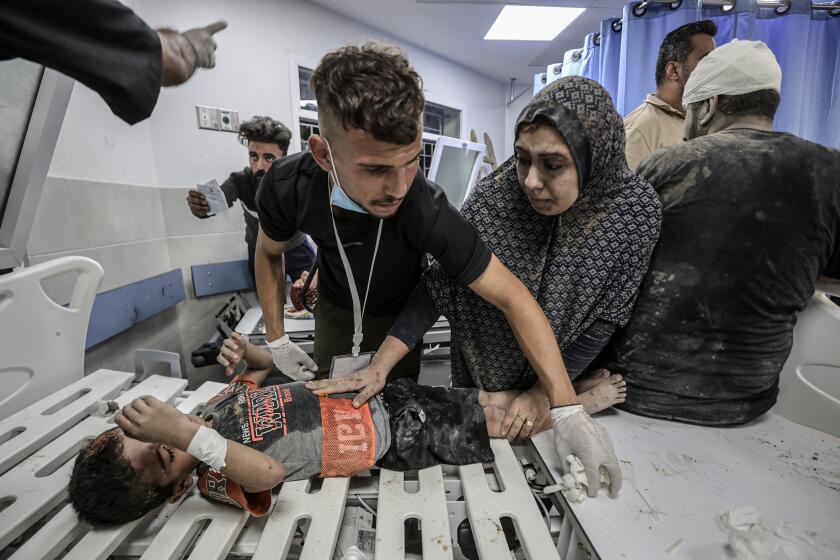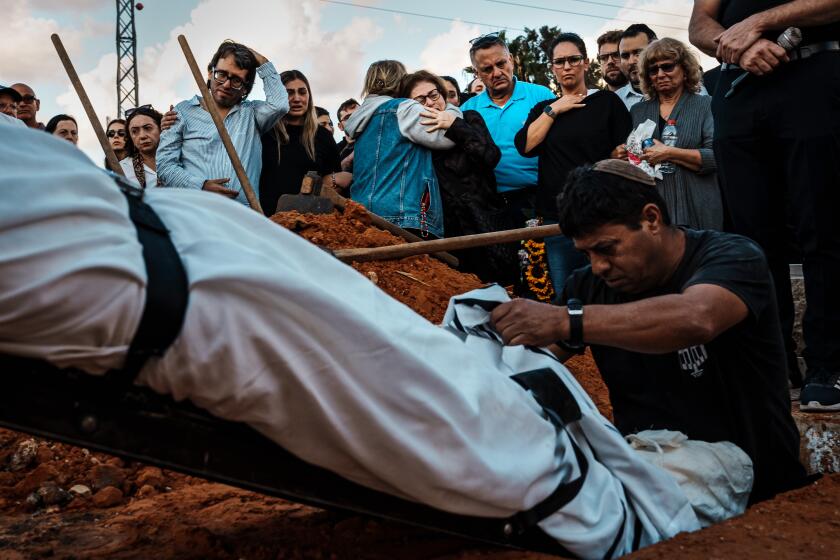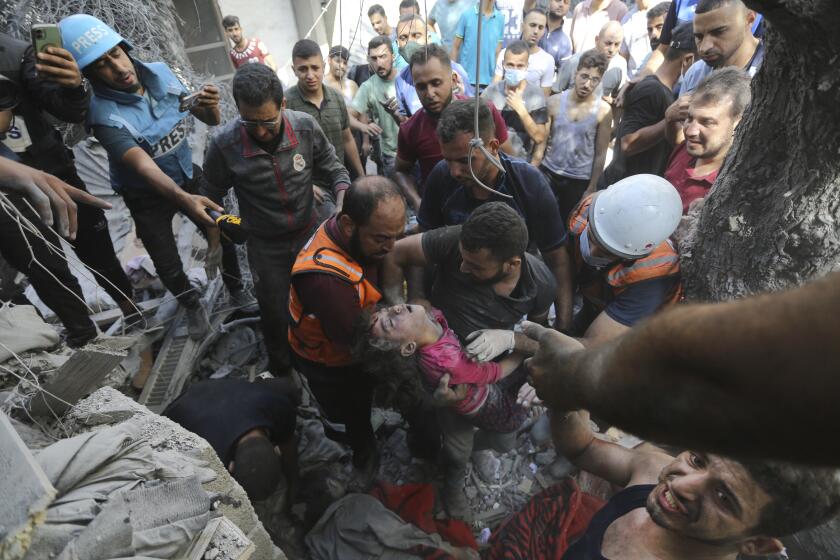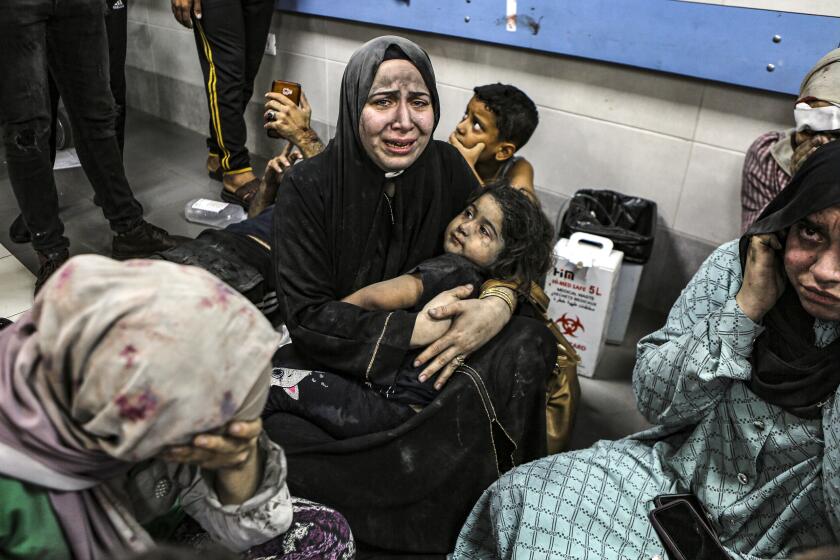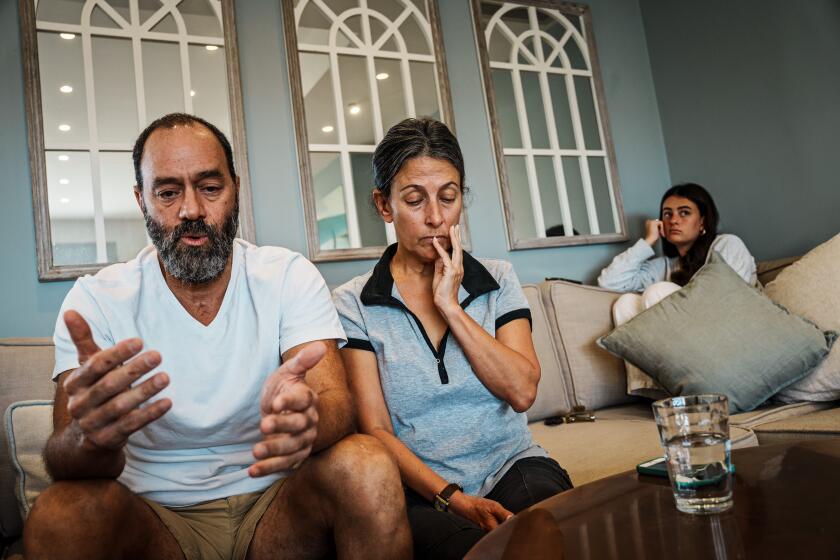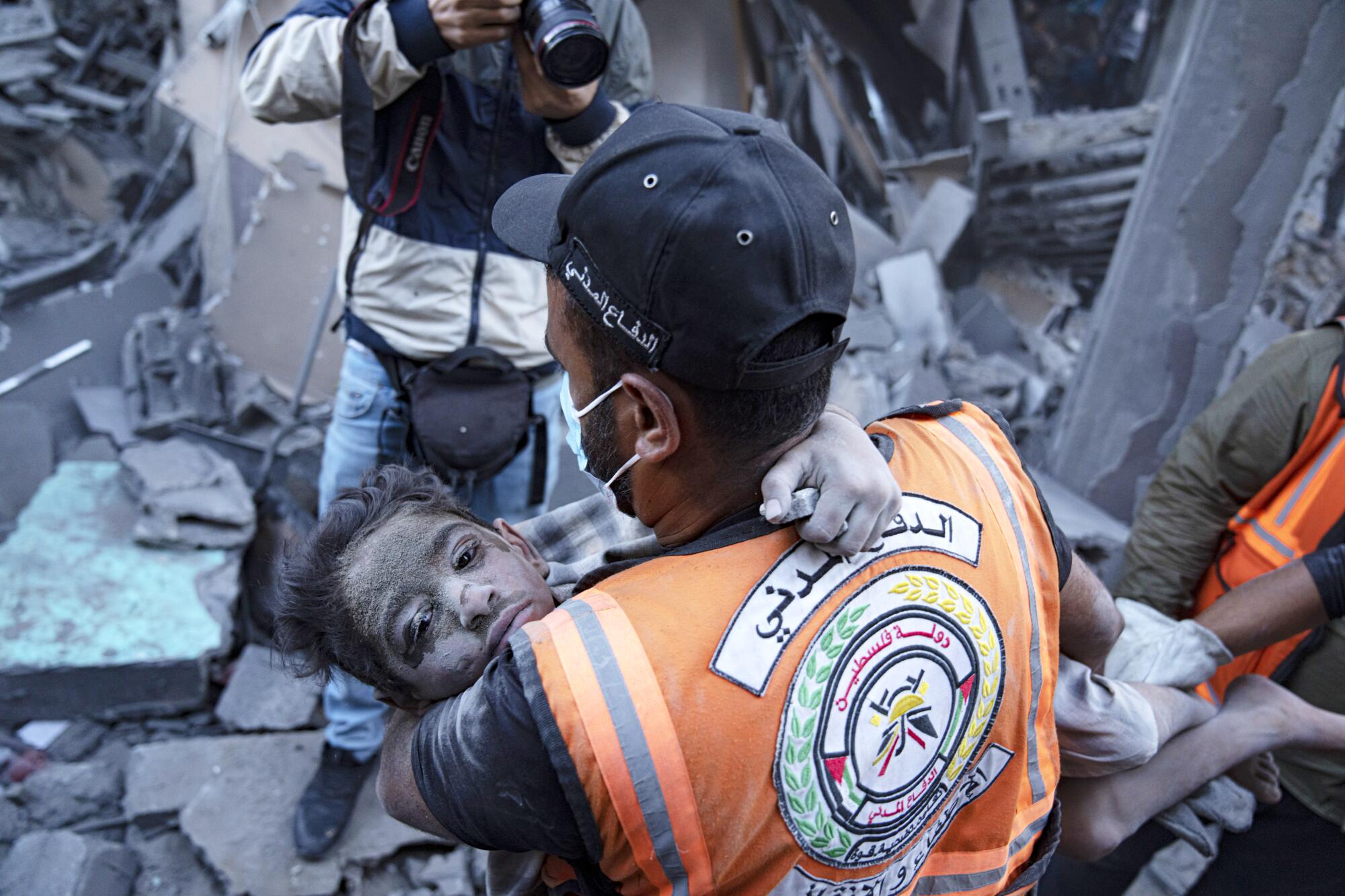
KHAN YUNIS, Gaza Strip — Israeli airstrikes pounded locations across the Gaza Strip on Thursday, including parts of the south where Israel told Palestinians to take refuge, as logistics continued to be worked out for a delivery of humanitarian aid into the territory through Egypt.
The Israeli military has relentlessly attacked Gaza in retaliation for a devastating Hamas rampage in southern Israel almost two weeks ago in which hundreds of civilians were slaughtered.
Even after Israel told Palestinians to evacuate from northern Gaza and flee south, strikes have extended across the seaside enclave while Palestinian militants continued firing rockets into Israel. Israel has said it is attacking Hamas militants wherever they may be in Gaza,
Meeting with Israeli infantry soldiers on the Gaza border Thursday, Defense Minister Yoav Gallant urged the forces to “get organized, be ready” for an order to move in. Israel has massed tens of thousands of troops along the border.
“Whoever sees Gaza from afar now, will see it from the inside,” he said. “I promise you.”
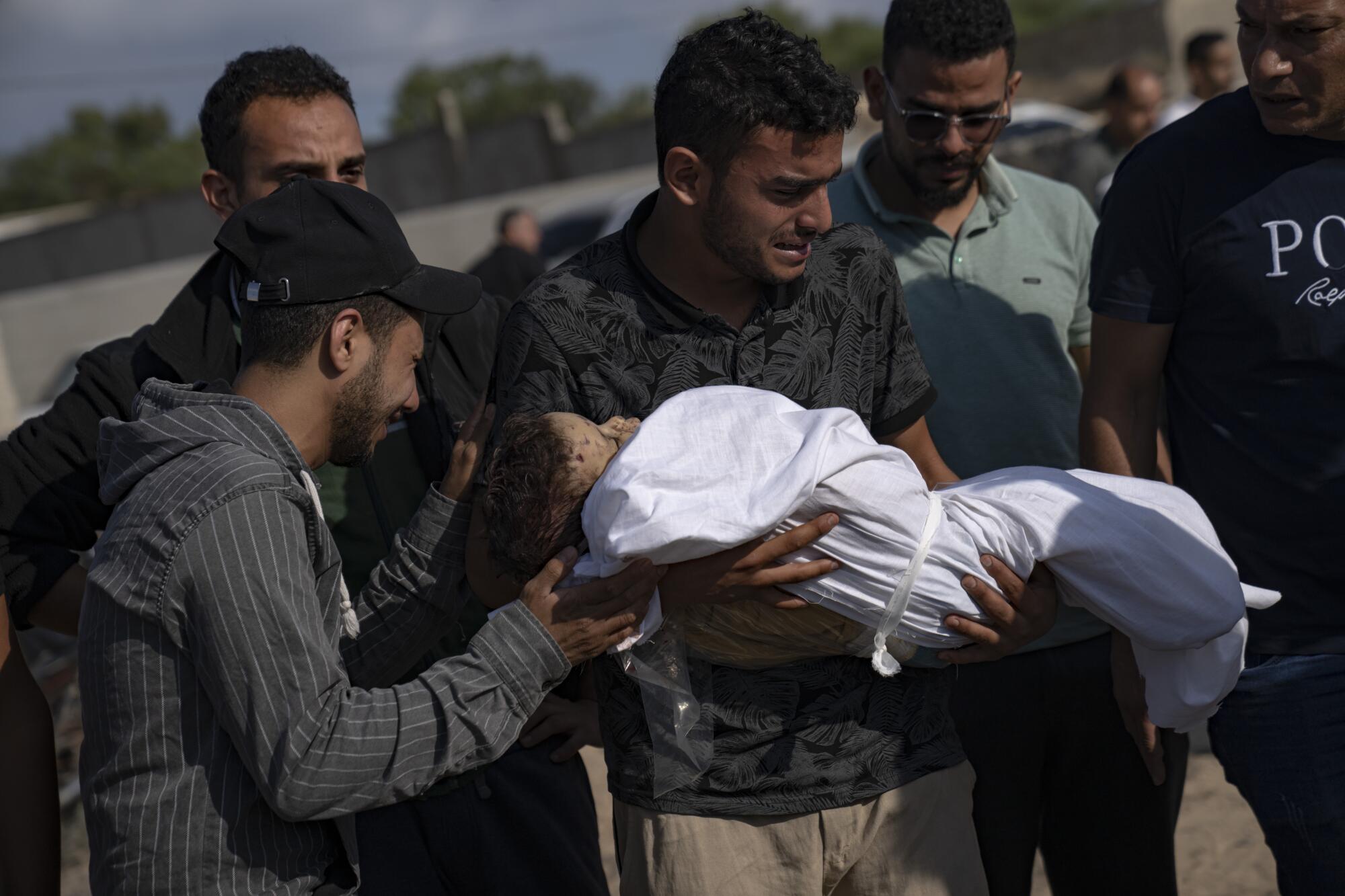
A residential building in Khan Yunis, a city in southern Gaza where hundreds of thousands of Palestinians had taken shelter, was among the places hit overnight. Medical personnel at Nasser Hospital said they received at least 12 dead and 40 wounded.
The bombardments came after Israel agreed Wednesday to allow Egypt to deliver food, water and medicine to Gaza, the first crack in a punishing 11-day siege. Many among Gaza’s 2.3 million residents have cut down to one meal a day and resorted to drinking dirty water.
After a hospital blast in Gaza, doctors struggling to save lives amid danger and dwindling supplies say they and the medical system are near collapse.
Israel did not list fuel as a permitted item, but a senior Egyptian security official said Egypt was negotiating for the entry of fuel for hospitals. The official spoke on condition of anonymity because he was not authorized to talk to the press.
With the Egypt-Gaza border crossing in Rafah still closed, the already dire conditions at Gaza’s second-largest hospital deteriorated further, said Dr. Mohammed Qandeel of Nasser Hospital in Khan Yunis. Power was shut off in most departments to save it for intensive care and other vital functions, and staff members were using cellphones for light.
At least 80 wounded civilians and 12 dead were taken to the hospital Thursday morning after witnesses said a strike hit a residential building in Khan Yunis. Doctors had no choice but to leave two of the incoming patients to die because there were no ventilators left, Qandeel said.
Israel-Hamas war: In Israel, a quest to identify unrecognizable bodies. In Gaza, bodies are piled and some stored in ice cream trucks as power fails.
“We can’t save more lives if this keeps happening, meaning more children ... more women will die,” he said.
A United Nations-brokered aid deal calls for a U.N. flag to be raised at the Rafah crossing and observers from the U.N. to inspect trucks carrying the supplies before they enter Gaza. Officials said the U.N., along with the Egyptian and Palestinian Red Crescent, would oversee the aid to ensure it is given to civilians and not used by Palestinian militants.
The World Health Organization said it was ready to enter Gaza with five truckloads of medical supplies if the border crossing reopens Friday. “Our trucks are loaded and ready to go,” said Director-General Tedros Adhanom Ghebreyesus.
The deal to get aid into Gaza through Rafah, the territory’s only connection to Egypt, remained fragile. Israel said that the supplies could only go to civilians in southern Gaza and that it would “thwart” any diversions by Hamas. President Biden said the deliveries “will end” if Hamas takes any aid.
With hundreds of Palestinian civilians reported dead in a Gaza inferno, dueling narratives from Israel and Hamas highlight danger that the war may spread.
Egypt must still repair the road across the border, which Israeli airstrikes turned into a no-man’s land, and on the Gaza side. No equipment had arrived to start the repair work as of Thursday afternoon, the Hamas spokesman for the crossing, Wael Abu Omar, said.
More than 200 trucks and about 3,000 tons of aid were positioned at or near Rafah, according to Khalid Zayed, the head of the Red Crescent for North Sinai.
U.S. officials said the first deliveries would probably take place Friday at the earliest, with an initial group of 20 trucks. The Egyptian security official also said the first trucks were expected to go in Friday.
Asked whether foreigners and dual nationals seeking to leave would be let out of Gaza into Egypt, Egyptian Foreign Minister Sameh Shoukry told Al Arabiya TV: “As long as the crossing is operating normally and the [crossing] facility has been repaired.”
Israel and the Palestinian militant group Hamas appear set to go head-to-head on the ground in Gaza. What’s each side’s endgame?
More than 1 million Palestinians, roughly half of Gaza’s population, have fled their homes in Gaza City and other places in the northern part of the territory since Israel told them to evacuate. Most have crowded into United Nations-run school shelters or the homes of relatives.
The Gaza Health Ministry said 3,785 people have been killed in the territory since the war began, the majority of them women, children and older adults. Nearly 12,500 others were injured, and an additional 1,300 people were believed buried under rubble of destroyed buildings, health authorities said.
More than 1,400 people have been killed in Israel, mostly civilians slain during Hamas’ deadly incursion on Oct. 7. Roughly 200 others were abducted. The Israeli military said Thursday that it had notified the families of 203 captives.
Following Thursday morning’s airstrikes, sirens wailed as emergency crews rushed to rescue survivors from a building in Khan Yunis, where many residents were believed trapped under twisted bed frames, broken furniture and concrete chunks.
A small, soot-covered child, unconscious and dangling in the arms of a rescue worker, was taken out of a damaged building and rushed toward a waiting ambulance.
Gaza’s Hamas-led government said several bakeries in the territory were hit in the overnight strikes, making it even harder for hungry residents to get food.
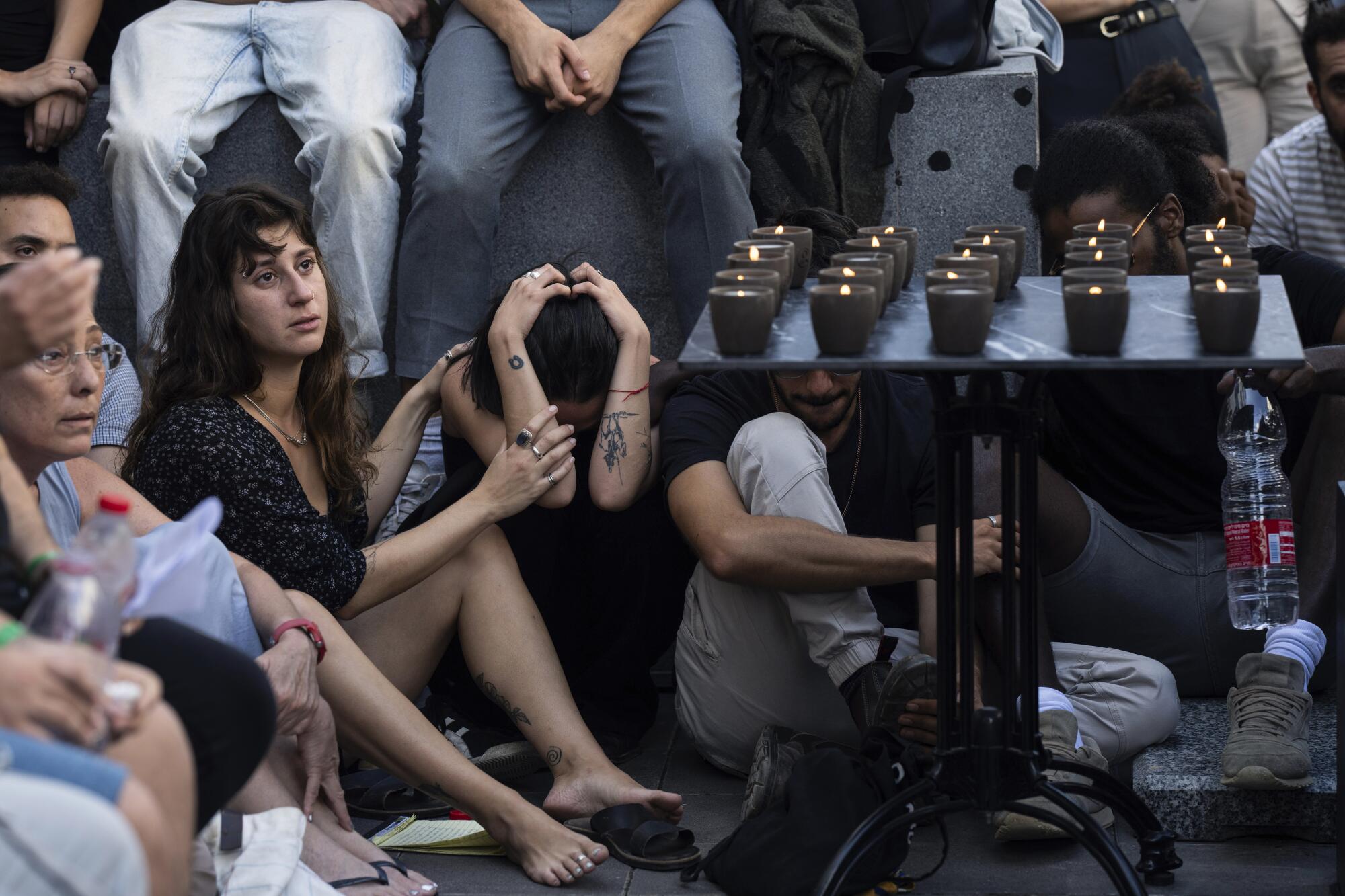
The Israeli military said it killed a top Palestinian militant in Rafah, near the Egyptian border, and hit hundreds of targets across Gaza, including tunnel shafts, intelligence infrastructure and command centers. It said it struck dozens of mortar-launching posts, most of them immediately after they launched shells at Israel. Palestinians have been launching barrages of rockets at Israel since the fighting began. Israel has accused the group’s leaders and fighters of taking shelter among the civilian population.
The Musa family fled to the typically sleepy central Gaza town of Deir al Balah and took shelter in a cousin’s three-story home near a hospital. But at 7:30 p.m. Wednesday, a series of explosions, believed to be airstrikes, rocked the building, turning the family home into a mountain of rubble that they said buried about 20 women and children.
After Saturday’s attack by Hamas militants in southern Israel, unofficial security forces are on high alert protecting synagogues, schools and Jewish communities in L.A.
The body of Hiam Musa, the sister-in-law of Associated Press photojournalist Adel Hana, was recovered from the wreckage Wednesday evening, the family said. They don’t know who else is under the rubble.
“It doesn’t make sense,” Hana said. “We went to Deir al Balah because it’s quiet — we thought we would be safe.”
The Israeli military said it was investigating.
In northern areas that Israel warned to evacuate, airstrikes also hit three residential towers in Al Zahra, the Hamas-led Interior Ministry in Gaza said, as well as homes along the border with Israel.
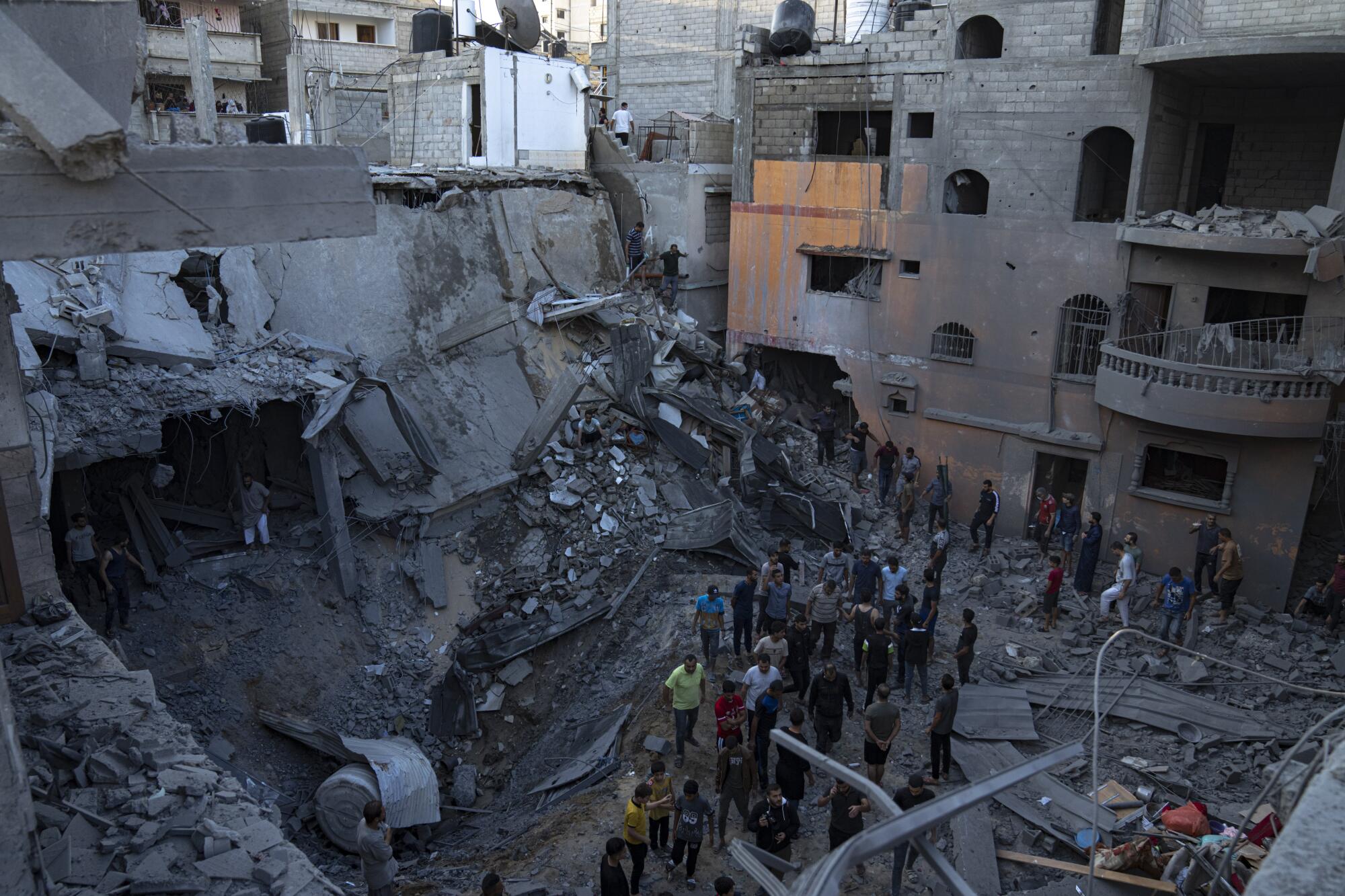
For the record:
6:31 a.m. Oct. 19, 2023An earlier version of this article said Israeli forces had killed dozens of Palestinians in the West Bank in the last two days, according to the Palestinian Health Ministry. The number of Palestinians killed during that period is 10, the ministry said.
Violence was also escalating in the West Bank, where Israel carried out a rare airstrike Thursday, targeting militants in the Nur esh Shams refugee camp. Israeli troops raided the camp the previous night and were still battling Palestinian fighters inside. Six Palestinians were killed in the camp, the Palestinian Authority’s Health Ministry said, and the Israeli military said the strike killed militants. Ten Israeli officers were wounded when fighters threw explosives at the troops. More than 74 Palestinians have been killed in the West Bank since the war started.
Hezbollah militants in Lebanon on Thursday said they fired missiles into northern Israel, hitting a kibbutz. The Israeli military said no one was injured and responded with shelling on border areas in Lebanon. Hamas militants also fired 30 rockets from southern Lebanese toward Israeli towns. Violence on the border comes amid fears the Hamas-Israel conflict could spread across the region.

Israeli Prime Minister Benjamin Netanyahu’s office said the decision to allow humanitarian aid into Gaza was approved after a request from Biden, who visited Israel on Wednesday to show his support.
Relatives of some of the hostages taken to Gaza during the Oct. 7 Hamas attack reacted with fury to the aid announcement.
California native Hersh Goldberg-Polin, 23, hasn’t been seen by family since before Hamas’ attack on Israel. They’re determined to find him and bring him home.
“Children, infants, women, soldiers, men, and elderly, some with serious illnesses, wounded and shot, are held underground like animals,” said a statement from the Hostage and Missing Families Forum. But “the Israeli government pampers the murderers and kidnappers.”
In his brief visit, Biden tried to strike a balance between showing U.S. support for Israel, while containing growing alarm among Arab allies. He also announced $100 million in humanitarian aid for Palestinians in Gaza and the West Bank.
Four U.S. officials familiar with the discussions between U.S. and Israeli officials said American diplomats had become increasingly alarmed by comments from their Israeli counterparts regarding their intention to deny water, food, medicine, electricity and fuel into Gaza, as well as the inevitability of civilian casualties. The officials spoke on condition of anonymity so they could discuss private conversations.
On Thursday, in an Oval Office address, Biden sought to tie the deadly Middle East conflict to Ukraine’s fight against Russia, calling both a threat to U.S. national security. He said U.S. leadership is “what holds the world together,” urging Americans to support his request for more aid for Israel and Ukraine.
“Our alliances are what keep us safe. And our values are what make us a partner that other nations want to work with,” Biden said. “We put all of that at risk if we walk away from Ukraine or turn our back on Israel.”
Jordan’s King Abdullah II planned to meet in Egypt with President Abdel Fattah Sisi to discuss the conflict. The two countries have peace agreements with neighboring Israel and are dealing with anger from their populations over Tuesday night’s explosion at Gaza City’s Ahli Arab Hospital, which Hamas said killed hundreds and blamed on Israel. Biden and other U.S. and Israeli officials say the blast was caused by a Palestinian rocket that went off course.
An unclassified U.S. intelligence assessment delivered to Congress estimated casualties in the explosion on the “low end” of 100 to 300 deaths. The death toll “still reflects a staggering loss of life,” U.S. intelligence officials said in the findings, which were seen by the Associated Press. Thursday’s findings echoed the conclusion that the explosion was not caused by an Israeli airstrike.
British Prime Minister Rishi Sunak arrived in Israel on Thursday on a trip aimed at showing solidarity with Israel and preventing the war from escalating.
The people of Israel “suffered an unspeakable, horrific act of terrorism, and I want you to know that the United Kingdom and I stand with you,” he said on arriving.
California Gov. Gavin Newsom also plans a one-day trip to Israel to meet some of those affected by the war.
The Democratic governor is due to arrive in Israel en route to China on Friday, his office said. The announcement did not specify where the governor would go but did say that California will send medical supplies to the region, including to the Gaza Strip.
Times staff writer Courtney Subramanian in Washington contributed to this report. Nessman reported from Jerusalem and Kullab from Baghdad. Associated Press journalists Amy Teibel and Isabel Debre in Jerusalem; Samy Magdy and Jack Jeffrey in Cairo; Matthew Lee and Mary Clare Jalonick in Washington; and Ashraf Sweilam in El-Arish, Egypt, also contributed to this report.
More to Read
Sign up for Essential California
The most important California stories and recommendations in your inbox every morning.
You may occasionally receive promotional content from the Los Angeles Times.
